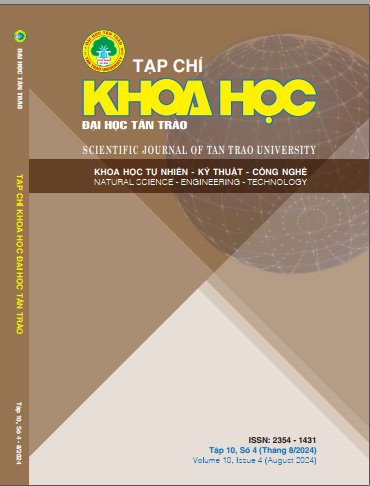ĐÁNH GIÁ HIỆU QUẢ SỬ DỤNG ĐẤT CỦA MỘT SỐ CÂY TRỒNG CHỦ LỰC TRÊN ĐỊA BÀN HUYỆN BẮC SƠN, TỈNH LẠNG SƠN
DOI:
https://doi.org/10.51453/2354-1431/2024/1224Tóm tắt
Bắc Sơn là huyện miền núi của tỉnh Lạng Sơn, có diện tích đất nông nghiệp chiếm 79,24 diện tích đất tự nhiên. Từ các yếu tố về đã xác định ba cây trồng chủ lực của Huyện là: cây Quýt vàng, Thuốc lá và Lạc đỏ. Đánh giá hiệu quả sử dụng đất cho thấy kiểu sử dụng đất cây Thuốc lá cho hiệu quả kinh tế trung bình (6 điểm) trong khi đó kiểu sử dụng đất cây Quýt vàng và Lạc đỏ cho hiệu quả kinh tế cao (lần lượt là 9 và 8 điểm). Cả 3 cây trồng chủ lực của huyện đều cho hiệu quả xã hội ở mức cao là những cây trồng tiềm năng kinh tế và xã hội lớn, đặc biệt là cây quýt vàng. Trong 3 loại cây trồng chủ lực thì quýt vàng có hiệu quả môi trường cao nhất do khả năng che phủ đất tốt (100%) và sử dụng thuốc bảo vệ thực vật và phân bón đúng khuyến cáo. Hai loại cây trồng còn lại cần phải kiểm soát tốt việc sử dụng phân bón và thuốc bảo vệ thực vật. Trong những năm tới bên cạnh việc chú trọng nâng cao hiệu quả kinh tế cần phải nâng cao kỹ thuật canh tác và hỗ trợ đầu tư về phân bón, thuốc BVTV hiệu quả để các cây trồng tiếp tục trở thành cây chủ lực của Huyện mang lại giá trị cao cho người dân.
Tải xuống
Tài liệu tham khảo
People's Committee of Bac Son District (2019-2023), Reports on the Implementation of Agricultural and Rural Indicators for 2019, 2020, 2021, 2022, and 2023.
People's Committee of Bac Son District, Explanatory report on the land use planning of Bac Son district, Lang Son province, up to 2030.
People's Committee of Bac Son District (2023), Land use plan for 2023.
Bui Van Sy (2012), Study on the Theoretical and Practical Basis of Land Potential Evaluation to Contribute to the Rational Use and Protection of Soil Resources in the Process of Industrialization and Modernization in Vietnam. Ministry-level Scientific Research Project, Ministry of Natural Resources and Environment, Hanoi.
Do Kim Chung, Pham Van Dinh, Tran Van Duc, Quyen Dinh Ha (1997), Agricultural Economics, Agriculture Publishing House, Hanoi.
Nguyen Ngoc Nong, Nong Thi Thu Huyen, Đo Thi Lan, Trương Thanh Nam, and Nguyen Duy Lam (2020). Textbook on Land Evaluation. Hanoi University of Science and Technology Publishing House.
Nguyen Van Bo and Bui Huy Hien (2001). Technological processes and soil conservation in agroforestry on sloping land. Proceedings of the conference on training, research, and technology transfer for sustainable development on sloping land in Vietnam. Agriculture Publishing House, Hanoi.
Nguyen Xuan Thanh (2021). Research on the conversion of agricultural land use to support the restructuring of the agricultural sector in Bac Ninh province. Doctoral Dissertation, Vietnam National University of Agriculture.
Vietnam Soil Science Association (2015), Handbook on Soil Investigation, Classification, Mapping, and Land Evaluation, Agriculture Publishing House, Hanoi.
Tải xuống
Đã Xuất bản
Cách trích dẫn
Số
Chuyên mục
Giấy phép

Tác phẩm này được cấp phép theo Giấy phép Quốc tế Creative Commons Attribution-ShareAlike 4.0 .
Bài báo được xuất bản ở Tạp chí Khoa học Đại học Tân Trào được cấp phép theo giấy phép Ghi công - Chia sẻ tương tự 4.0 Quốc tế (CC BY-SA). Theo đó, các tác giả khác có thể sao chép, chuyển đổi hay phân phối lại các bài báo này với mục đích hợp pháp trên mọi phương tiện, với điều kiện họ trích dẫn tác giả, Tạp chí Khoa học Đại học Tân Trào và đường link đến bản quyền; nêu rõ các thay đổi đã thực hiện và các nghiên cứu đăng lại được tiến hành theo cùng một bản quyền.
Bản quyền bài báo thuộc về các tác giả, không hạn chế số lượng. Tạp chí Khoa học Tân Trào được cấp giấy phép không độc quyền để xuất bản bài báo với tư cách nhà xuất bản nguồn, kèm theo quyền thương mại để in các bài báo cung cấp cho các thư viện và cá nhân.
Mặc dù các điều khoản của giấy phép CC BY-SA không dành cho các tác giả (với tư cách là người giữ bản quyền của bài báo, họ không bị hạn chế về quyền hạn), khi gửi bài tới Tạp chí Khoa học Đại học Tân Trào, tác giả cần đáp ứng quyền của độc giả, và cần cấp quyền cho bên thứ 3 sử dụng bài báo của họ trong phạm vi của giấy phép.






